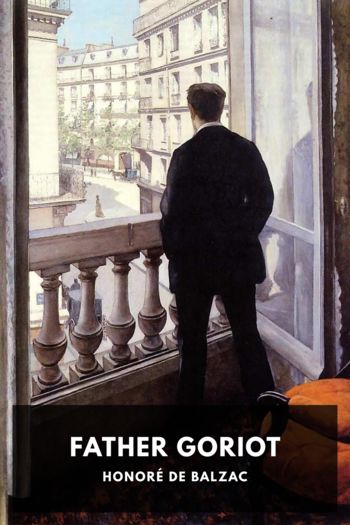Father Goriot - Honoré de Balzac (fantasy novels to read .txt) 📗

- Author: Honoré de Balzac
Book online «Father Goriot - Honoré de Balzac (fantasy novels to read .txt) 📗». Author Honoré de Balzac
Such a gathering contained, as might have been expected, the elements out of which a complete society might be constructed. And, as in a school, as in the world itself, there was among the eighteen men and women who met round the dinner table a poor creature, despised by all the others, condemned to be the butt of all their jokes. At the beginning of Eugène de Rastignac’s second twelvemonth, this figure suddenly started out into bold relief against the background of human forms and faces among which the law student was yet to live for another two years to come. This laughingstock was the retired vermicelli-merchant, Father Goriot, upon whose face a painter, like the historian, would have concentrated all the light in his picture.
How had it come about that the boarders regarded him with a half-malignant contempt? Why did they subject the oldest among their number to a kind of persecution, in which there was mingled some pity, but no respect for his misfortunes? Had he brought it on himself by some eccentricity or absurdity, which is less easily forgiven or forgotten than more serious defects? The question strikes at the root of many a social injustice. Perhaps it is only human nature to inflict suffering on anything that will endure suffering, whether by reason of its genuine humility, or indifference, or sheer helplessness. Do we not, one and all, like to feel our strength even at the expense of someone or of something? The poorest sample of humanity, the street Arab, will pull the bell handle at every street door in bitter weather, and scramble up to write his name on the unsullied marble of a monument.
In the year 1813, at the age of sixty-nine or thereabouts, “Father Goriot” had sold his business and retired—to Mme. Vauquer’s boarding house. When he first came there he had taken the rooms now occupied by Mme. Couture; he had paid twelve hundred francs a year like a man to whom five louis more or less was a mere trifle. For him Mme. Vauquer had made various improvements in the three rooms destined for his use, in consideration of a certain sum paid in advance, so it was said, for the miserable furniture, that is to say, for some yellow cotton curtains, a few chairs of stained wood covered with Utrecht velvet, several wretched colored prints in frames, and wall papers that a little suburban tavern would have disdained. Possibly it was the careless generosity with which Father Goriot allowed himself to be overreached at this period of his life (they called him Monsieur Goriot very respectfully then) that gave Mme. Vauquer the meanest opinion of his business abilities; she looked on him as an imbecile where money was concerned.
Goriot had brought with him a considerable wardrobe, the gorgeous outfit of a retired tradesman who denies himself nothing. Mme. Vauquer’s astonished eyes beheld no less than eighteen cambric-fronted shirts, the splendor of their fineness being enhanced by a pair of pins each bearing a large diamond, and connected by a short chain, an ornament which adorned the vermicelli-maker’s shirt front. He usually wore a coat of cornflower blue; his rotund and portly person was still further set off by a clean white waistcoat, and a gold chain and seals which dangled over that broad expanse. When his hostess accused him of being “a bit of a beau,” he smiled with the vanity of a citizen whose foible is gratified. His cupboards (ormoires, as he called them in the popular dialect) were filled with a quantity of plate that he brought with him. The widow’s eyes gleamed as she obligingly helped him to unpack the soup ladles, tablespoons, forks, cruet-stands, tureens, dishes, and breakfast services—all of silver, which were duly arranged upon shelves, besides a few more or less handsome pieces of plate, all weighing no inconsiderable number of ounces; he could not bring himself to part with these gifts that reminded him of past domestic festivals.
“This was my wife’s present to me on the first anniversary of our wedding day,” he said to Mme. Vauquer, as he put away a little silver posset dish, with two turtledoves billing on the cover. “Poor dear! she spent on it all the money she had saved before we were married. Do you know, I would sooner scratch the earth with my nails for a living, madame, than part with that. But I shall be able to take my coffee out of it every morning for the rest of my days, thank the Lord! I am not to be pitied. There’s not much fear of my starving for some time to come.”
Finally, Mme. Vauquer’s magpie’s eye had discovered and read certain entries in the list of shareholders in the funds, and, after a rough calculation, was disposed to credit Goriot (worthy man) with something like ten thousand francs a year. From that day forward Mme. Vauquer (née de Conflans), who, as a matter of fact, had seen forty-eight summers, though she would only own to thirty-nine of them—Mme. Vauquer had her own ideas. Though Goriot’s eyes seemed to have shrunk in their sockets, though they were weak and watery, owing to some glandular affection which compelled him to wipe them continually, she considered him to be a very gentlemanly and pleasant-looking man. Moreover, the widow saw favorable indications of character in the well-developed calves of his legs and in his square-shaped nose, indications still further borne out by the worthy man’s full-moon countenance and look of stupid good-nature. This, in all probability, was a strongly-build animal, whose brains mostly consisted in a capacity for affection. His hair, worn in ailes de pigeon, and duly





Comments (0)